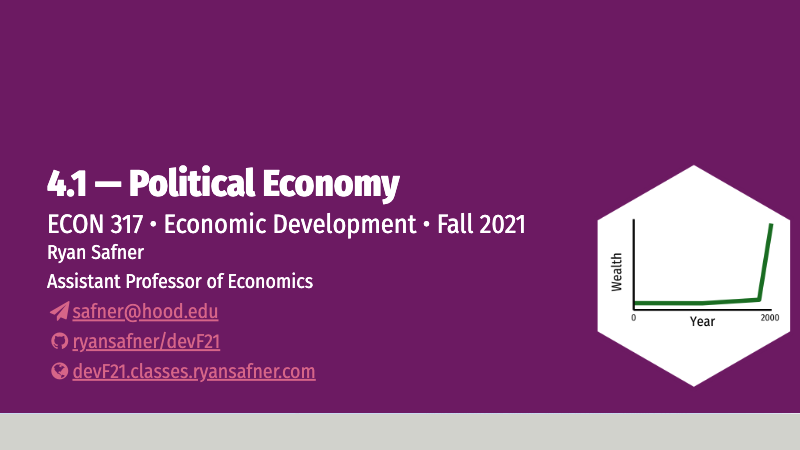Overview
We finally begin discussing institutions and their role in economic development. First, we discuss some motivating problems of political economy, the knowledge problem & incentive problem, that different societies try to solve with various institutions. We discuss some of the more specific political-economic problem that must be addressed: that self-interested people will find ways to benefit themselves, even if it comes at the expense of others. What we would like is to create institutions and rules that channel that fundamental motivation into productive outcomes that benefit society, rather than outcomes that only benefit the person, and are unproductive or destructive towards society. In doing so, we contrast profit-seeking with rent-seeking, the latter of which can cause unproductive and destructive outcomes.
Required Reading
- Chapter 3 in Acemoglu and Robinson, 2012, Why Nations Fail
Chapter 3 outlines the central thesis of the book: that differences in income per capita around the world today, and the trajectories of economic development are determined by political and economic institutions. AJR1 distinguish between “inclusive institutions” and “extractive institutions,” and describe how the distribution of political power affects political institutions, which in turn affect economic institutions, which affects a nation’s ability to sustain economic growth.
Strongly Recommended
- Chapter 1 in Acemoglu and Robinson, 2012, Why Nations Fail
Chapter 1 sets the stage with a number of stories that emphasize the differences in inclusive vs. extractive institutions, primarily by comparing the colonization experience of the Spanish in South/Central America and the English in North America.
Primary Sources
- Stigler (1971), “The Theory of Economic Regulation”
- Kreuger (1974), “The Political Economy of the Rent-Seeking Society”
- Acemoglu and Robinson (2000), “Political Losers as a Barrier to Economic Development”
- Acemoglu, Johnson, and Robinson (2001), “The Colonial Origins of Comparative Development: An Empirical Investigation”
- Acemoglu and Johnson (2005), “Unbundling Institutions”
- Baumol (1990), “Entrepreneurship: Productive, Unproductive, and Destructive”
- Tullock (1967), “The Welfare Cost of Tariffs, Monopolies, and Theft”
- Murphy, Shleifer, Vishny (1991), “The Allocation of Talent: Implications for Growth”
- Glaesar et. al (2004), “Do Institutions Cause Growth?”
- Mitchell (2012), “The Pathology of Privilege — The Economic Consequences of Government Favoritism”
- Munger and Villareal-Diaz (2019), “The Road to Crony Capitalism”
Questions to Read For
What does Baumol mean that entrepreneurship can be “productive,” “unproductive,” or “destructive,” and what role do institutions play?
What is the problem with “finding the right people” to elect/appoint to govern a society?
Related to the previous question, how do the knowledge and incentive problems affect how we govern society? What does a society that is robust to those problems mean, or look like?
What is the nirvana fallacy?
Why do people make different assumptions about how consumers make (selfish/irrational/foolish/etc) choices in a market economy, vs. the how (the same!) people make (wise/public-spirited) choices in politics (as voters, elected officials, dictators, etc)? What are the implications of assuming the same people are guided by self-interest in these different arenas?
What is the different between profit-seeking and rent-seeking? What role do institutions play in creating/changing the difference?
According to Acemoglu and Robinson, what is the difference between “inclusive” institutions and “extractive” institutions?
According to Acemoglu and Robinson, why is it political losers, rather than economic losers, that are more likely to block creative destruction and innovation?
Acemoglu, Johnson, and Robinson argue that a major cause of differences in GDP per capita today come from historical institutions, especially in former colonies, the type of colony that was set up hundreds of years ago — either inclusive or extractive. One of the primary factors determining what type of colony Europeans chose to set up was disease — is this geography affecting development (through institutions) all over again?
Slides
Below, you can find the slides in two formats. Clicking the image will bring you to the html version of the slides in a new tab. Note while in going through the slides, you can type h to see a special list of viewing options, and type o for an outline view of all the slides.
The lower button will allow you to download a PDF version of the slides. I suggest printing the slides beforehand and using them to take additional notes in class (not everything is in the slides)!
The common nickname for “Acemoglu, Johnson, and Robinson”, who frequently collaborate on these issues (see the primary sources below).↩︎
